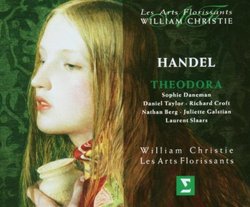The best Theodora yet
J. Luis Juarez Echenique | Mexico City | 10/22/2003
(5 out of 5 stars)
"Theodora unlike many other Handel oratorios has been very lucky on records. About 2 years ago Archiv released their own recording with The Gabrieli Consort and Paul McCreesh conducting and it was an excellent performance. It would have been hard to believe that any other recording could better it anytime soon, but as it happens, William Christie was the man to do the job.
His experience performing it in in Glyndebourne and elsewhere shows at every turn, his vision of the story is far more dramatic and taut than McCreesh's, and no less surprising, more beautiful too. His incomparable chorus and orchestra cover themselves with glory, and Erato's marvelous sound is better defined and warmer than Archiv's.
Both teams of soloists are even, both are extremely good, though it is a pity that David Daniels didn't appear in any set, his Dydimus at Glyndebourne was one of best things he has ever done.
Whatever you do don't miss Theodora a superb masterpiece, and if you are in doubt I bet you won't regret buying Christie's."
Subtlety in expression
Arnout Koeneman | the netherlands | 06/19/2006
(5 out of 5 stars)
"It's a tough choice.
Both William Christie's and Paul McCreesh's Theodora are great.
I think McCreesh's performance is more idiomatic, the choir is better disciplined and the playing and singing overall a tad more controlled and precise.
But Christie is livelier, more dramatic and at times more subtle and elegant too.
They both use different tempi for certain chorals and airs.
The chorus "Come mighty father" for instance is taken more rapidly and rhythmic by McCreesh.
Christie is slightly more timid and 'vocal' and I prefer it that way, his "Come mighty father" is 'lovely' where McCreesh's is 'jolly'
Theodora's air "With darkness deep as is my woe" is taken dramatically broader by McCreesh and I like it better that way, although I much prefer Sophie Daneman's voice in Christie's Theodora over McCreesh's Susan Gritton.
In the final chorus "O love divine, thou source of fame" I like Christie's slower pacing much better than McCreesh's more outgoing and joyous pacing.
But overall McCreesh chooses slower tempi and his orchestra is less expressive and sharp than Christie's.
Christie's performance is more forward moving, theatrical, McCreesh somewhat more statlely or 'British' if you like.
The soloists in Christie's reading also give him the advantage over McCreesh in my opinion.
Especially Sophie Daneman and Nathan Berg are excellent.
What a lovely voice Daneman has!
A woman you instantly fall in love with without even seeing her.
Berg is very authorative, he sounds like a big bearded man - surprisingly he doesn't look like he sounds at all (type his name in Google image search)
Christie's choir is as always very spontaneous, not as polished and disciplined as McCreeshes singers, but I prefer it that way.
Christie's pacing is spot on, I like his subtlety in expression.
There are some really quiet moments where it seems the music has stopped, but without interupting the pulse and drama.
Christie's way is a very different one than Rene Jacobs' for instance
He isn't afraid to keep certain parts rather understated and 'empty', Jacobs certainly would've add more "noise" to keep the tension - in a more obvious way.
Like I said: Christie is much more subtle and understated, but both ways are valid and do I like very much.
(But I don't think Jacobs' highly dramatic way would've worked in this piece, nor do I think I would've liked Christie's way in Saul for instance)
Not every air and chorus of this oratorio is nice.
I passionately dislike Didymus' air "The raptured soul defies the sword", 8 minutes and 30 seconds long...boooring.
And Irene's air "Bane of virtue", when she sings - as the music stops - "Prosp-eeee-rity!", I almost have to laugh, it sounds so amateurishly and poorly written.
But every single air by Theodora, lovely sung by Sophie Daneman, is a real treat.
And especially the end-chorus "O love divine, thou source of fame" is very, very beautiful.
Recommended."
Fantastic at every level
Marcolorenzo | Italy | 01/15/2006
(5 out of 5 stars)
"This is a fanstastic recording at all levels, the musical, the dramatic and the sound quality level. The reason we don't know this Handel masterpiece Theodora is that the complete score without the unfortunate numerous revisions and cuts made by Handel after the not well received first performance is that it wasn't until 1985! that this complete score was rediscovered and published. Listen to this recording. It's a masterpiece; Handel probably considered it his best work! It's at the level of The B-minor Mass (Bach), The Magic Flute (Mozart), Giulio Cesare and Orlando(Handel), Tristan and Isolde (Wagner) in my opinion."


 Track Listings (30) - Disc #1
Track Listings (30) - Disc #1